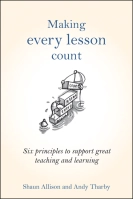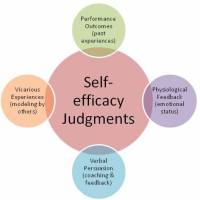Today we hosted the inaugural ‘Making every lesson count conference’ at Durrington. I started my presentation by outlining three things that were instrumental in the development of the book:
- A visit to my loft and a look through some of my wife’s old chemistry exercise books – from 1985 when she was taught by the legendary Mr Clarke. More on this here.
- Reading the books ‘An Ethic of Excellence’, ‘Bounce‘ and ‘Mindset’.
- Reading the Sutton Trust paper ‘What makes great teaching?‘
This, alongside much between discussion between myself and Andy about the day to day practice of some of the best teachers we have worked with, resulted in the development of the six principles that are the focus of the book:
This has become our teaching and learning policy at Durrington – it seems to work for a number of reasons.
“Tight but loose”
Robert Plant once attributed the success of Led Zeppelin to their ‘tight but loose’ approach. Tight, because they were all fantastic musicians in their own right, with a shared idea about the sound they wanted to create. Loose, because they were allowed to express themselves creatively as individuals.
We take the same approach with our teachers – the message is clear. Embed the 6 principles into your teaching, but do it in a way that suits your teaching style. Giving teachers this creativity and freedom has been liberating for them.
“Common Language”
It has given us a common language when we talk about teaching. We know what we are talking about, when we talk about modelling, practice etc. This creates a rich discussion about pedagogy within and between subjects.
“Meaningful for all”
The principles apply to all subjects – so have meaning and purpose across the school. Whilst we will of course implement them differently across different subjects, the ideas and the thinking underlying them is the same. This means that we are all pulling in the same direction as teachers and because of this, students are getting a consistent approach across their lessons e.g. high levels of challenge; probing questions; time to engage with deliberate practice etc.
“Less is more”
I’ve written before about why Brazil is such a great footballing nation. One factor is that they play ‘futsal’. This is a much smaller version of the game – the ball is smaller, as is the pitch, goals etc. This requires the players to refine the basic skills of the game – so they focus on what matters. The six principles do the same i.e. they focus the professional learning of teachers on the things that contribute to great teaching. So during appraisal meetings for example, all teachers discuss which of the principles they want to focus on and develop.
This leads on to the next aspect of the presentation. How do we structure the professional learning at Durrington, to allow teachers to grow and develop? What we try to achieve is a professional learning ‘menu’ that allows a culture like the one often described by Tim Brighouse to flourish:
 We do this by offering a layered approach to professional learning.
We do this by offering a layered approach to professional learning.
There are a range of optional and regular activities, that staff can engage with at a level that suits them. This encourages staff to talk about teaching in an informal and collaborative way. Many of the activities e.g. 15 minute forums, blog of the week, research bulletins etc, will be based around the six principles.
Recently have been placing the focus of our professional learning, much more within the context of subjects – great teachers are great at teaching their subject. We have done this, this year during INSET days with the ‘Subject Pedagogy Development Sessions’, which have been successful – we talk about a particular aspect of pedagogy, to the whole staff and then they go back into their subject teams, to discuss how it applies to their subject context. However, next year we are planning to take this a stage further with the ‘Subject Planning & Development Sessions’. This will facilitate regular, subject focused CPD that will have a direct impact in the classroom throughout the year. Every 2 weeks, subject teams will meet and discuss – what are we teaching over the next fortnight? How do we teach it best? Who has some great resources to share? What are the possible misconceptions and how can we overcome them? What are the challenging bits and how can we support students with this? Where are the opportunities to really stretch and challenge students? We think this is going to be a key step in the next stage of our teaching and learning development work. This is what CPD should be about.
Teachers are busy people, so need some support with organising personalised professional learning that is specific to their needs. Furthermore in a big school, if they want to develop an aspect of their teaching e.g. questioning, by observing a colleague, they might not know who to observe to see best practice in this area. So every term, they are given a form to complete to request support with planning a particular CPD activity. We then help them to organise this. The form looks like this:
Finally we try to ensure that there is a range of support/development programmes in place for colleagues in different stages of their career.
Impact?
We are often asked how we know the ‘6 principle approach to teaching’ and our professional learning programme is making a difference? Like all things in education, it is very difficult to claim a direct link, as there are so many variables involved. However, the following suggests that something must be working:
- A sustained improvement in exam outcomes – suggests students are learning well:
- Our whole school attendance is strong – suggests that students feel happy and safe at school.
- We have been regularly oversubscribed in recent years – with cohorts of 330 – suggests that our local community trust us.
- We retain our new staff – suggests that staff feel that it is a place where they will be supported to grow and develop.
- Most importantly, our students show us in so many ways that they are confident, resilient, hard-working and very nice young people.
Andy then went on to discuss each of the six principles in detail:
And finally, a new review on Amazon today sums up the spirit of the book perfectly!




























Please can I work at your school?!
Pingback: Making Every Lesson count | Kesgrave High School
Reblogged this on Y Byd a'r Betws – Blog B J Mock and commented:
Dysgu ac addysgu. Nodweddion addysgu rhagorol ac effeithiol. Gwych.
Pingback: Teaching and Learning Policy | @TeacherToolkit
Reblogged this on Bob Pritchard and commented:
Love this approach – a clear focus on what’s important and the opportunity for all staff to develop without losing the individuality that often makes teachers special.
Pingback: Getting to the heart of teacher led CPD | Class Teaching
Do you have plans to write a similar book aimed at primary teaching? Thank you!
Yes. It is being written now and should be available in the summer.
Oh wow, amazing! Thank you so much. I shall look forward to reading it!
Pingback: Teaching Talk – New for 2017 | Class Teaching
Pingback: #TLCONF17 @OsirisEdu 2017 | Alex Camenzuli | teachaldenham
Just re-reading this again! It’s brilliant!!!